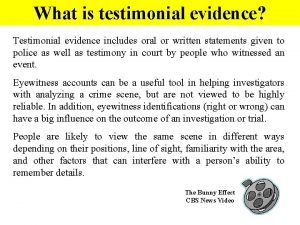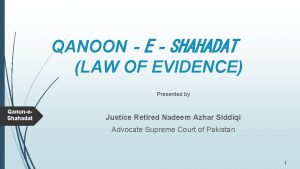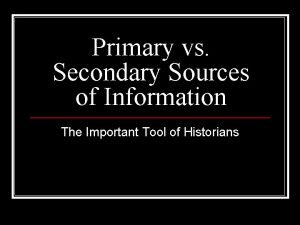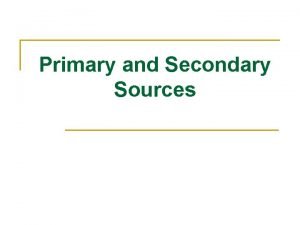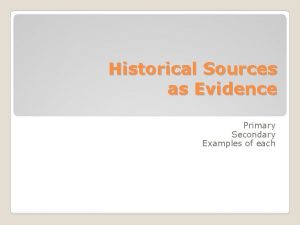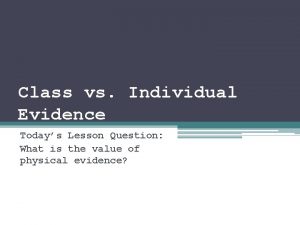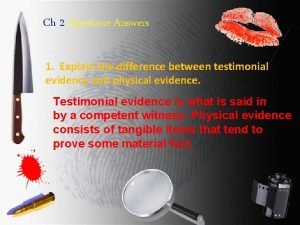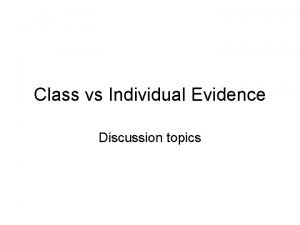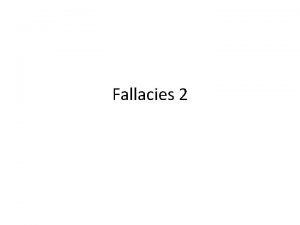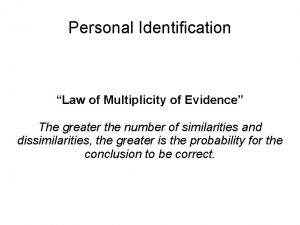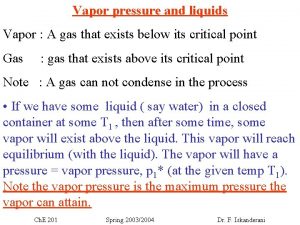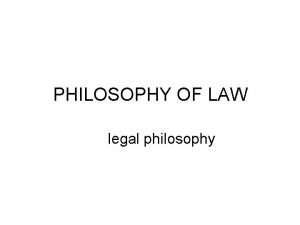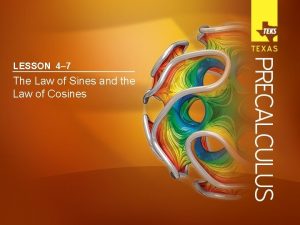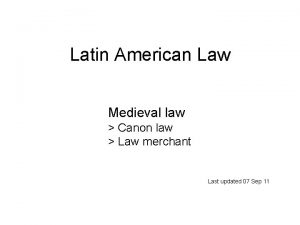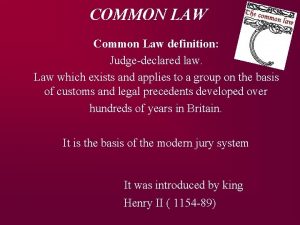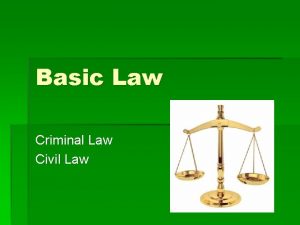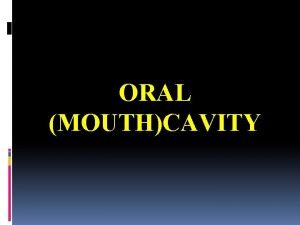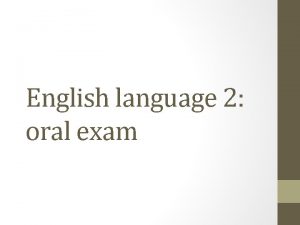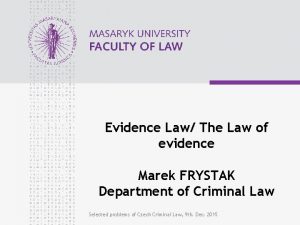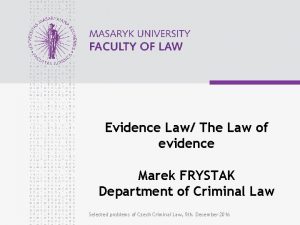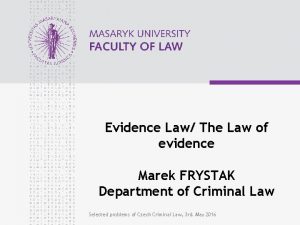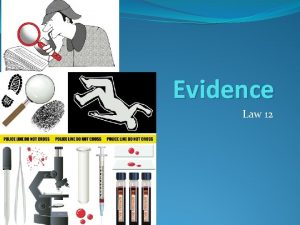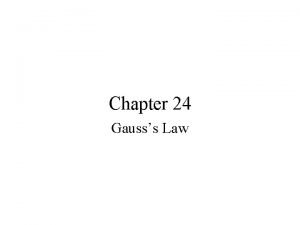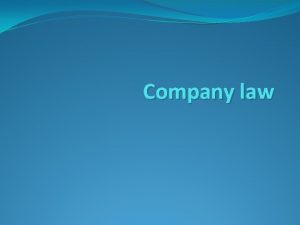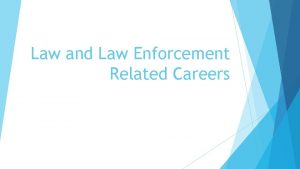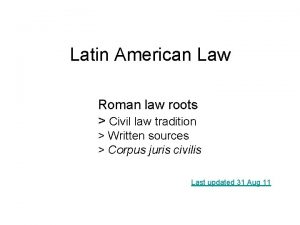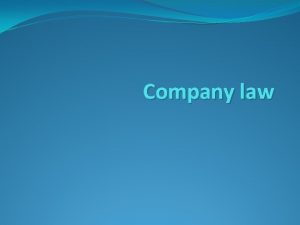Law of Evidence Oral Evidence 1 Oral evidence























- Slides: 23

Law of Evidence Oral Evidence 1

Oral evidence n n Oral: spoken or uttered, distinct from written. Oral evidence: evidence given by word of mouth; the oral testimony of witness to prove the truth of the matter asserted 2

Competence of witness n The competence refers to the ability , capacity or qualification of a witness to give evidence in a court of law. 3

The general rule of competence The general rule is that all persons are competent to testify unless the court considers that they are prevented from understanding the questions put to them or from giving rational answers to those questions by reason of: 1. tender years; 2. extreme old age; 3. disease whether body or mind. n 4

Competence in special cases n n n The accused Deaf and dump Husband wife Children of tender years Accomplices (guilty associate) 5

Compellability of witness n n Compellability refers to the question whether or not a competent witness can be ordered by a court of law to give evidence. The general rule is that all competent witnesses are compellable, that is, can be compelled to give evidence. 6

Exceptions of compellability n n n The accused cannot be compelled to give evidence that incriminates himself. Privilege of spouse Privilege of court (unless ordered by supreme court) Privilege of official communication and records Privilege of information relating to commission of offences. Privilege of legal professions 7

Privilege of spouse No person who is married or has been married may give evidence as against the other spouse, in regard to anything that has taken place during the existence of such marriage, even though the marriage has been dissolved for any reason, except: a) with the express consent of the Spouse; or b) in relation to any offence alleged to have been committed by the spouse against I) the person giving the evidence; ii) the ascendant or descendant of either of the spouses. n 8

Number of witness n n In the most cases the law does not limit the witness a person call to prove a certain fact. In Islam the witness in Zina (adultery), the witness must be four in number. Also financial offence would be 2 witnesses. But the other hudud offences there is no specific number or kind fully agreed by fuqaha. 9

Number of witness n The general rule is that evidence should be weighed not counted. However, the court has discretion to limit the number of witness. 10

Proof of facts by oral evidence The witness should testify under this conditions: 1. ability to observe(see/hear) 2. ability to remember 3. ability to communicate n 11

Examination of witness Except as otherwise provided by law, a witness shall be examined: A) orally in open court B) In the presence of the accused C) Under oath or affirmation n 12

Oath and affirmation n n ( I swear in the name of God to tell the truth, the whole truth and nothing but the truth) ( I solemnly declare that I will tell the truth, the whole truth and nothing but the truth) 13

Stages and procedure in examination of witness There are three stages of examination of witness: 1. examination-in-chief 2. Cross-examination 3. Re-examination n 14

n n n Examination-in-chief means the examination of witness by the party that calls him. Cross-examination means the examination of a witness by the party other than the party which calls him Re-examination means examination of witness by the party who called him subsequent to the cross-examination 15

Order of examination 1. A witness shall first be examined-in-chief; then, if the other party so desires, the witness may be cross-examined; then, if the party calling the witness so desires, the witness may be re-examined. 2. The examination-in-chief and the crossexamination shall relate to relevant facts but the cross-examination need not be confined to the facts which the witness testified to in his examination-in-chief. 16

Order of examination 3. The re-examination shall be directed to the explanation of matters referred to in cross-examination; and if new matter is introduced, with the permission of the Court, ¡n re-examination, the other party may further cross-examine upon that matter. 17

Leading question means any question put to a witness in such a way as to suggest a reply that the party putting the question wishes or expects to receive n The leading question has two characteristics: 1. It suggests the answer desired 2. It assumes that existence of disputed facts as to which the witness is yet to testify n 18

Leading question 1. Leading questions shall not be asked in an examination in-chief or in a re-examination except with the permission of the Court. 2. The Court may permit leading questions in examination-in-chief and re-examination only as to matters which are introductory or undisputed or which have, in its opinion, been already sufficiently proved. 19

Refreshing the memory of a witness n n The witness in the course testifying in a court may refer to a document i. e. , dairy, log book or account book, to refresh his memory. Referring to a document is with the permission of the court, and the court will determine its admissibility 20

Question lawful in crossexamination When a witness is cross-examined, he may be asked any question which tends: A) to test his veracity B) to discover who he is and what is his position in life C) to shake his credit n 21

Impeaching the credit of a witness n 1. 2. 3. 4. The credit of a witness may be impeached by the party other than the party calling him or, with the consent of the court, by the party who has called him: Evidence of persons that he is unworthy of credit Interest or enemy Former statement inconsistent with his evidence Convicted by crime against modesty or honour 22

The end Any question so far? 23
 Newton's first law and second law and third law
Newton's first law and second law and third law Newton's first law
Newton's first law V=k/p
V=k/p P=k/v
P=k/v Testimonial evidence includes
Testimonial evidence includes Qanoon e shahadat
Qanoon e shahadat Primary evidence vs secondary evidence
Primary evidence vs secondary evidence Primary evidence vs secondary evidence
Primary evidence vs secondary evidence Primary evidence vs secondary evidence
Primary evidence vs secondary evidence Primary evidence vs secondary evidence
Primary evidence vs secondary evidence Jobs vancouver
Jobs vancouver Fiber evidence can have probative value.
Fiber evidence can have probative value. Class vs individual evidence
Class vs individual evidence Individual evidence can have probative value
Individual evidence can have probative value Class and individual evidence
Class and individual evidence Amphiboly fallacy
Amphiboly fallacy Multiplicity and me
Multiplicity and me Raoult's law and dalton's law
Raoult's law and dalton's law What is a civil law
What is a civil law Programl
Programl Positive law vs natural law
Positive law vs natural law Positive law vs natural law
Positive law vs natural law Law of dominance
Law of dominance 4-7 the law of sines and the law of cosines answers
4-7 the law of sines and the law of cosines answers




